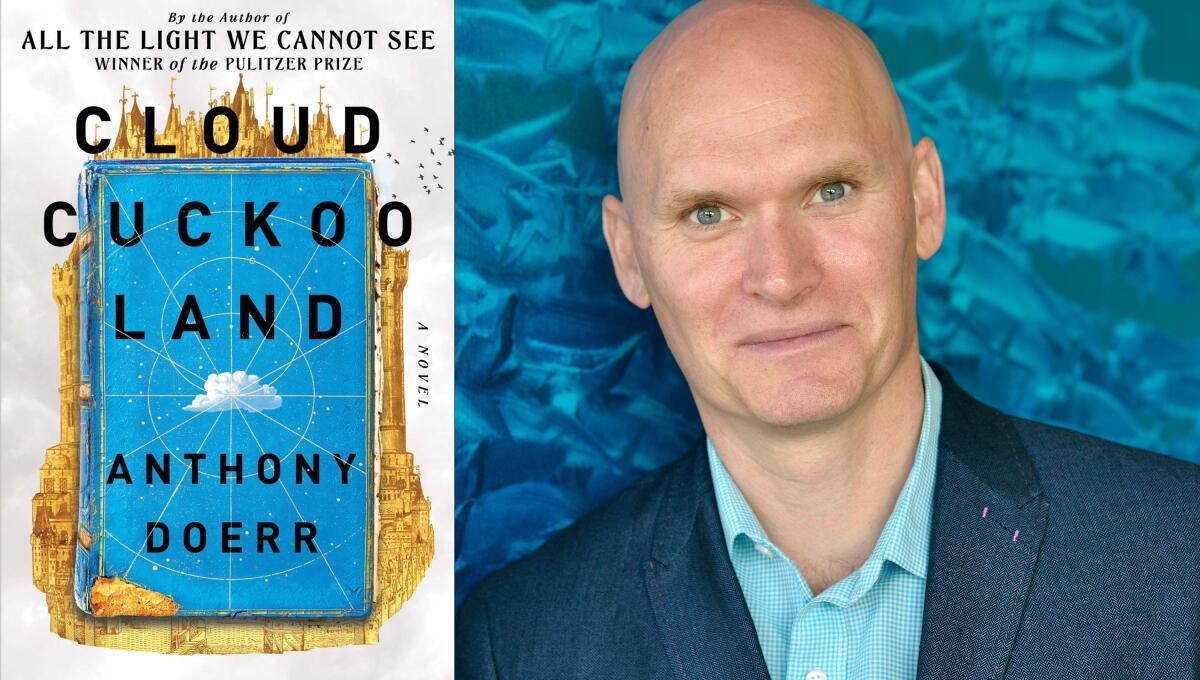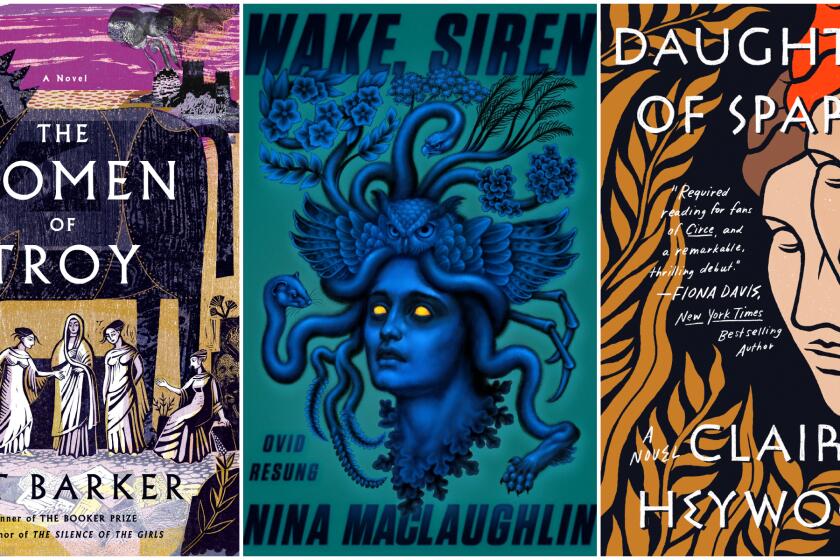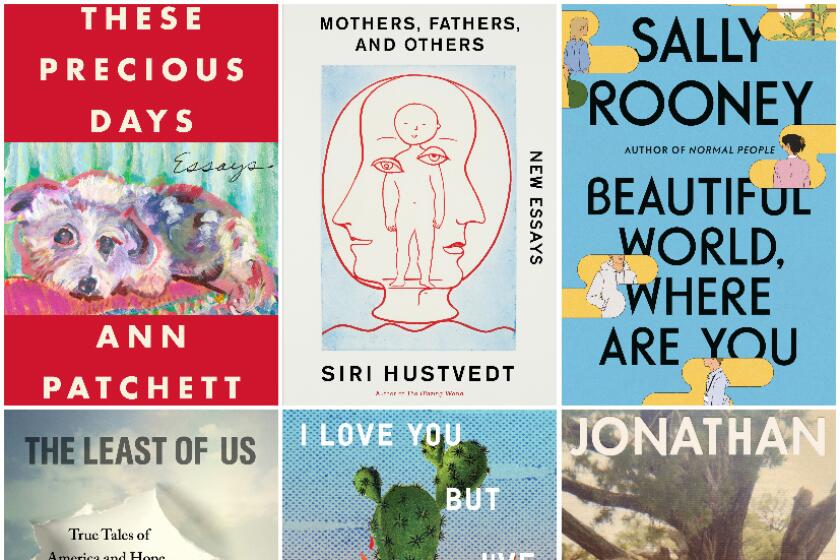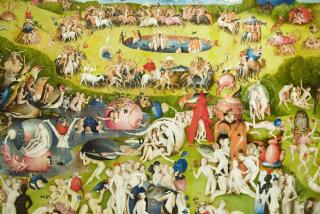Review: Anthony Doerr asks us to save ourselves by looking beyond ourselves

On the Shelf
Cloud Cuckoo Land
By Anthony Doerr
Scribner: 640 pages, $30
If you buy books linked on our site, The Times may earn a commission from Bookshop.org, whose fees support independent bookstores.
In Anthony Doerr’s astonishing, Pulitzer Prize-winning 2014 novel, “All the Light We Cannot See,” the central metaphor was blindness. In his new work, “Cloud Cuckoo Land,” it is the book itself — or rather the idea of the book. Bound volumes, codices and manuscripts are woven into the lives of his characters: A painstakingly translated story is read aloud to a dying needleworker; Greek epics sustain two prisoners of war; books in a future outer-space library instruct a teenage girl about life on Earth.
As we debate the fate of printed matter and the utility of its electronic successors, Doerr’s ambitious novel has as much to say on the subject as Susan Orlean did in her biblio-history, “The Library Book.” One of his storylines concerns Constantinople on the eve of the siege that finally toppled its walls after 1,000 years. The city’s legendary library was destroyed, but here a girl named Anna, a seamstress trained in filching its treasures, manages to hold on to a leatherbound manuscript containing stories by Antonius Diogenes involving a shepherd named Aethon and his search for unknown lands. (Real writer, fictional book.)
This is not where “Cloud Cuckoo Land” begins or ends. In the present day, a group of fifth-graders in Lakeport, Idaho, are rehearsing their version of Diogenes’ work, “Cloud Cuckoo Land,” at the local library. Their director is 86-year-old Zeno Ninis, a retired snowplow driver who became fascinated with ancient Greek texts during his Korean War service. There is also, we know from the start, a student named Seymour, and he has a bomb. But hold that thought.
As Doerr weaves through Constantinople and a third storyline, in which 14-year-old Konstance (geddit?) lives with her doting parents in a space vehicle named the Argos in search of a new habitable planet, we know we are deep inside a series of nested, time-shifted stories sure to remind some readers of a similarly titled forebear, David Mitchell’s “Cloud Atlas.” While both authors weave together different timelines, though, Doerr is less interested in world-building than world-connecting. His meta-narrative is not a pointillistic patchwork but a seamless tapestry.
Anthony Doerr’s ‘Cloud Cuckoo Land’ is the latest reworking of ancient tales from Greece to Nigeria. Many give voice to those on the sidelines.
The Argos contains food printers that can produce “a nice risotto,” sacks of Nourish powder and systems for everything from elimination to education. There is also a being known as Sybil consisting of “a translucent cylinder that rises fourteen feet from floor to ceiling . . . a machine composed of trillions of golden threads, none thicker than a human hair.” Sybil’s tangles offer the convenience of Alexa, the all-seeing menace of a Nest doorbell (or is it HAL from “2001”?) and the tactile pleasures of an old-fashioned Encyclopedia Britannica, its pleather bindings offering Konstance both solace and answers.
As she delves into the mysterious origins of Diogenes’ book, Konstance will learn that the most important answers are beyond even Sybil’s scope. And the reader comes to learn of the dangers of secrets and misreadings — with consequences for Seymour, the young eco-terrorist, as well as Zeno, who hid his love for a male wartime comrade.
It was Zeno’s sorrow that focused him on a decades-long study of the Diogenes text. In that story, Aethon morphs into different animals as he journeys around the world, counterpoising the theme of constancy in Doerr’s book — in all books — with the idea that the only inevitability is change. Change in life, change in civilizations, change in an imperiled natural world.
Ultimately, Doerr seeks to remind us of the many ways we are tied to that natural world, for good and ill. In Anna’s medieval story, great armies rely on the right weather for attack. Her traveling companion, a young ox-team driver named Omeir, depends on the bounty and mercy of the seasons. Zeno suffers the cold Korean mud but finds peace in Idaho’s snowbanks. And Konstance spends hours on her Perambulator, wearing her high-tech Vizer, virtually traversing the globe from Nigeria to Greece to Bosnia, hungry for the now-vanishing world.
Mark Haskell Smith on his latest book, “Rude Talk in Athens,” about an obscure ancient Greek playwright and comedy as a form of revolution.
It isn’t until Konstance learns to read a set of carefully placed clues that she realizes the atlas she’s been using hasn’t been properly interpreted. Unless you know what to look for, you might think our lives are as anodyne as Lakeport in 2020, with its SUVs and McMansions. You might miss points of contact hidden in the text — as when Seymour dubs a rare owl Trustyfriend, a name he probably picked up from Zeno’s teachings on Aristophanes’ “The Birds.”
The characters in “Cloud Cuckoo Land,” from the would-be bomber to 10-year-olds making papier-mâché heads to a girl marooned on a spaceship, unite through acts of translation.
Every story, Doerr seems to say, requires interpretation and deep attention. Shouldn’t that be so for the story of Earth too? We humans have been so busy thinking about our own survival, through suffering and war and natural disasters, that we’ve paid little mind to the living, breathing system that sustains us.
At the end of the novel, Konstance breaks through a wall. It’s one of several unexpected turns revealing, above all, that Doerr still hopes for human redemption. Does he believe in it? What matters more is whether the reader does — whether we have the will to breach the walls we have constructed.
Patrick is a freelance critic who tweets @TheBookMaven.
Sally Rooney, Anthony Doerr, Maggie Nelson, Richard Powers, Jonathan Franzen — the list goes on. Four critics on kicking off a big, bookish fall.
More to Read
Sign up for our Book Club newsletter
Get the latest news, events and more from the Los Angeles Times Book Club, and help us get L.A. reading and talking.
You may occasionally receive promotional content from the Los Angeles Times.










